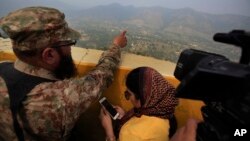Amnesty International is joining demands Pakistani authorities immediately revoke travel restrictions on one of the country’s leading journalists for reporting details of a high-level secret meeting on national security matters.
The human rights watchdog condemned the ban as a crude intimidation tactic designed to silence journalists and stop them from doing their jobs. It also criticized the “chilling” language used by Prime Minister Nawaz Sharif’s office.
Audrey Gaughran, Amnesty’s International’s Director of Global Issues said, “Journalism is not a crime. They should be able to work freely and without fear. The Pakistani authorities must break with a longstanding practice of subjecting media workers to intimidation, threats, restrictions on movements, enforced disappearances and violenc.”
Cyril Almeida, the prominent journalist in question, announced overnight through his official Twitter account, “I am told and have been informed, and have been shown evidence that I am on the Exit Control List."
The placement of his name on the list means Almeida cannot leave Pakistan and he was forced to abandon a family holiday trip to Dubai.
The punitive action stemmed from an October 6 front-page story Almeida wrote for his English-language DAWN newspaper, detailing a face-off between Prime Minster Nawaz Sharif and the country’s spy chief, Lt.-General Rizwan Akhtar.
The civilian leadership at the meeting urged the director general of the Inter-Services Intelligence, or ISI, to take action against anti-India and anti-Afghan militant groups operating out of Pakistan to prevent the country from being internationally isolated, according to the article.
The Sharif government has since repeatedly issued denials, dismissing the story as fabricated and irresponsible journalism.
The latest denial came after Monday’s a meeting between the prime minister and the military chief, with Akhtar and other top government officials in attendance, to discuss the controversial article. An official statement later quoted Sharif as directing “those responsible should be identified for stern action.”
The newspaper promptly responded by saying it stands by the story and reiterated its contents had been “verified, cross-checked and fact-checked”, according to a statement by the editor.
It went to on to warn, "The elected government and state institutions should refrain from targeting the messenger, and scapegoating the country’s most respected newspaper in a malicious campaign.”
Politicians and journalists across Pakistan have sharply reacted the imposition of the travel ban on Almeida and called for its immediate removal.
“Whether a story is poorly sourced or spot-on, journalism does not merit a travel ban. Take his name off the list, Prime Minister Nawaz Sharif, and end this embarrassment to the country,” lamented opposition Senator Sherry Rehman.
The extreme step against the journalist is unprecedented in Pakistan. The so-called Exit Control List is primarily meant to bar criminals, loan defaulters, under trial suspects and politicians, as well as former government officials accused of corruption from leaving the country.
The independent Human Rights Commission of Pakistan has also called for removal of all curbs on the journalist.
“Barring Cyril Almeida from traveling abroad and the apparent pressure on his employers, the highly respected DAWN newspaper, will cause distress to all those, at home and abroad, who believe in the freedom of expression and the rights of journalists. This is not the time to turn the international journalist community against Pakistan, warned the organization.
Government vs. military
While revelations of alleged covert links between ISI and militant groups are not new, the newspaper article, critics believe, has once again exposed traditional tensions between the civilian and military establishments, with both sides trying to assert themselves over matters related to national security and foreign policy, particularly when it comes to dealing with India and Afghanistan.
The general perception is the military has the final say in the decision-making process related to these countries.
A journalist-activist, Matiullah Jan, says the civilian government’s own weaknesses have apparently prompted it to release content of the high-level meeting through anonymous sources, instead of issuing a formal statement for fear of a military backlash.
“I think this is where the problem lies. The problem is not with the messenger, but with the people who are trying to communicate and they are unfortunately doing it timidly because they know that if they do it openly and publicly there is going to be a problem,” Jan noted.
Tensions with past civilian governments prompted the military to stage coups and seize power. They included the coup against Sharif’s government in 1999 that led to his dismissal and subsequent exile to Saudi Arabia with his entire family on controversial terrorism charges.
“After leaking the story, they (the civilian government) are now giving the impression that action against Cyril taken on army insistence after (Monday’s) meeting, and making sure the things are mentioned in the press release so that blame is again shifted to [the army] General Headquarters and ISI for targeting a journalist,” a source within the security establishment said in a statement sent to VOA when asked whether they were behind the travel ban on the reporter.
The Pakistani spy agency has long been accused of covertly supporting the Taliban insurgency in Afghanistan and sheltering leaders of the notorious Haqqani Network involved in deadly cross-border terrorist attacks against the U.S. led military coalition and Afghan forces.
Islamabad denies the charges as baseless. It also rejects Indian allegations that Pakistan-based banned militant groups, including Lashkar-e-Taiba and Jaish-e-Mohammad, are plotting terrorist attacks in India with ISI backing.
The latest alleged civil-military confrontation also comes as Sharif is readying to pick a new military leader to replace Chief of Army Staff General Raheel Sharif (not related to the premier) who is due to retire next month. It is widely believed the incumbent army chief has until now indirectly conducted Pakistan’s relations with Afghanistan, the United States, and India.




